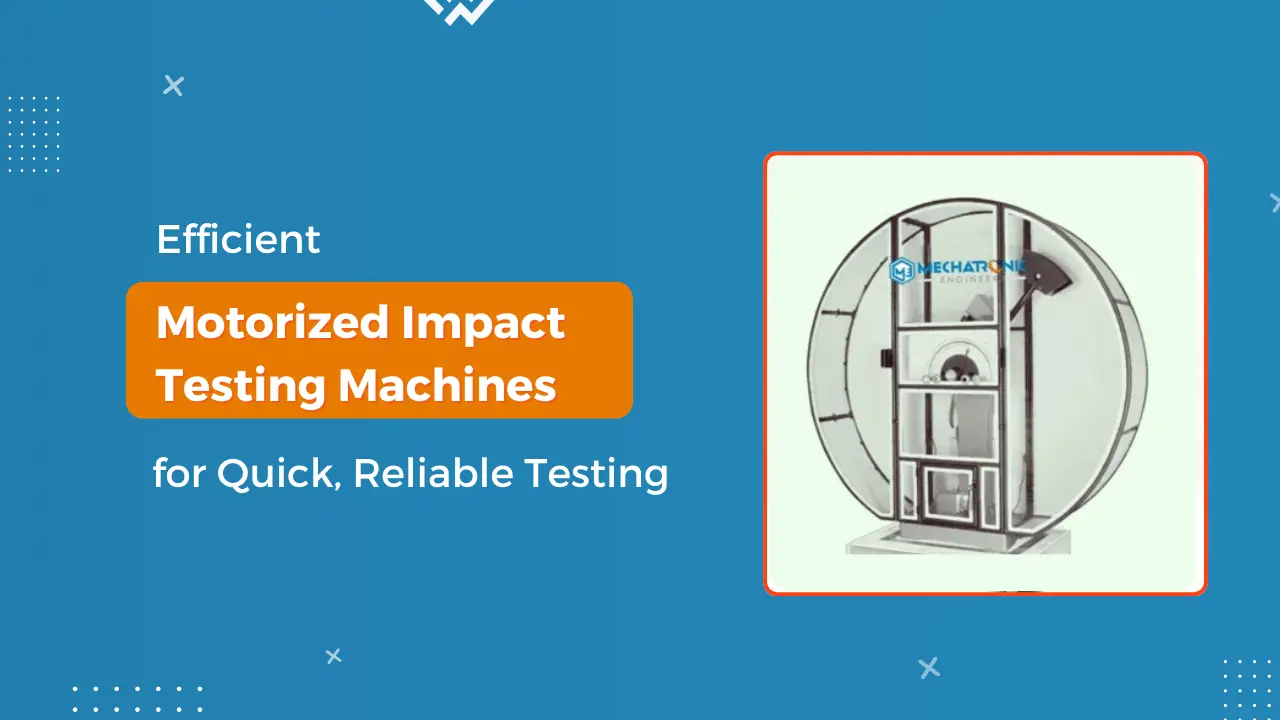
These machines are engineered for high-throughput environments where efficiency, safety, and repeatability are essential. At Mechatronic Engineers, we specialize in developing motorized impact testers that streamline the entire testing process—from pendulum lift to data reporting—while maintaining strict compliance with international standards like ASTM E23 and ISO 148.
What Is a Motorized Impact Testing Machine?
A motorized impact testing machine automates one of the most physically repetitive tasks in materials testing: the lifting and releasing of the pendulum hammer. It is used for Charpy or Izod impact tests, which determine a material’s ability to absorb energy and resist sudden failure.
The machine drops a pendulum from a calibrated height, and the energy absorbed by the specimen during fracture is measured in joules. By automating the pendulum’s movement and braking, the motorized variant eliminates manual effort, reduces operator fatigue, and improves overall accuracy.
Core Benefits of Motorized Impact Testing
1. Enhanced Productivity
In high-volume labs or production lines, manual operation slows things down. A motorized model can double or even triple the number of tests performed per shift, thanks to rapid resetting and single-button operation.
2. Reduced Operator Fatigue
Frequent lifting of a heavy pendulum is not only tiring but also leads to inconsistent results over time. Motorized lifting makes the process ergonomic and fatigue-free—ideal for continuous testing operations.
3. Improved Test Repeatability
Precision in impact energy, drop height, and braking is vital. By removing manual variability, these machines offer repeatable results every time, which is critical for quality assurance, compliance, and R&D.
4. Greater Safety
Equipped with interlocking doors, acrylic guards, and magnetic braking systems, motorized machines minimize human exposure during impact, making the lab environment safer.
Standout Features of Mechatronic’s Motorized Impact Testers
Applications Across Industries
Motorized impact testing machines are not limited to one sector. Their versatility makes them indispensable in:
Automotive Industry
For testing crash-resistant parts such as bumpers, suspension arms, and body panels to improve vehicle safety and performance.
Construction and Infrastructure
Evaluating steel beams, rebar, and support columns to ensure compliance with building codes and resistance to accidental impacts or stress during natural disasters.
Aerospace and Defense
Assessing lightweight, high-strength composites and alloys used in aircraft, drones, and defense systems for reliability under extreme conditions.
Manufacturing and OEMs
Routine quality checks on metallic and polymer components during mass production to avoid downstream failures and ensure consistent product integrity.
Research & Educational Institutes
Ideal for labs conducting academic research or training future engineers in material science and structural analysis.
Why Choose a Motorized Tester Over a Manual One?
If you’re currently using a manual impact testing machine, you may be familiar with its limitations—manual lifting, inconsistent braking, slower testing cycles, and operator fatigue.
Here’s what motorized systems improve:
- Speed: Test cycles are significantly shorter.
- Consistency: Automation ensures uniform energy delivery.
- Operator Comfort: No manual lifting means no strain.
- Data Integrity: Optional digital models offer automated result logging, reducing manual entry errors.
Smart Integration and Digital Upgrades
In today’s digitally connected labs, testing equipment must be more than just mechanical. Mechatronic’s motorized machines can be enhanced with:
- Touchscreen Interfaces for easy navigation and parameter setting.
- USB and LAN Ports for data transfer and remote monitoring.
- LIMS/ERP Integration to embed testing data directly into enterprise systems.
- Auto Reporting Functions that generate downloadable test reports with timestamps, operator info, and specimen details.
These features make your lab not only faster but smarter—supporting better decision-making and quality control documentation.
Frequently Asked Questions (FAQs)
Motorized machines automate pendulum lifting and braking, making them faster, safer, and more ergonomic compared to manual machines which require physical effort and offer lower throughput.
Yes, our machines can be configured for both types with interchangeable accessories and sample holders.
Not at all. Mechatronic’s machines are designed to be maintenance-free, with high-durability components and low-wear mechanisms.
In some cases, yes. We offer consultation to assess if retrofitting is possible, though a new machine is often the more economical and efficient option.
Absolutely. Their rapid operation, safety features, and automation make them perfect for high-throughput environments in automotive, construction, and aerospace sectors.
Make the Smart Move to Motorized Impact Testing
When your lab or production floor demands speed, precision, and uncompromised safety, a motorized impact testing machine isn’t just an upgrade—it’s an operational game-changer.
Whether you’re validating material toughness for crash safety, certifying structural components for seismic resistance, or pushing the boundaries of aerospace innovation with new-age composites, automated impact testing streamlines your workflow and eliminates the inconsistencies of manual methods.
By investing in a motorized solution from Mechatronic Engineers, you’re not only embracing automation—you’re unlocking:
- Operator Safety and Comfort – eliminate repetitive strain with effortless pendulum lifting
- Consistent and Accurate Results – achieve high repeatability for every test
- Compliance with Global Standards – meet ASTM E23, ISO 6507, and IS protocols with confidence
- Operational Efficiency at Scale – perform more tests, faster, with fewer errors and delays
Discover the efficiency of motorized impact testing – contact us to learn more and explore a tailored solution for your lab or production line.
